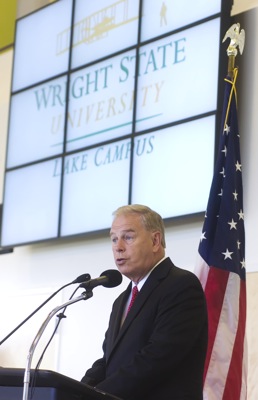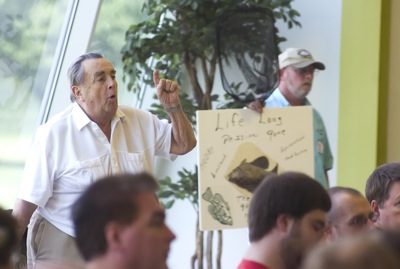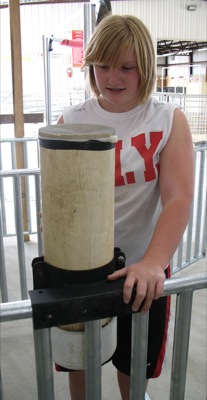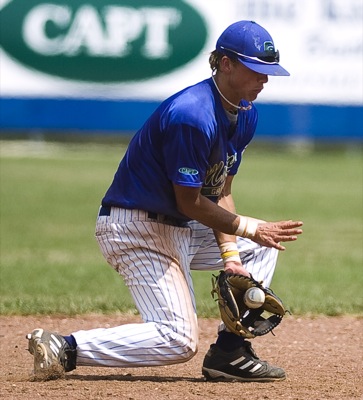Saturday, July 31st, 2010
Proposed ban on spreading manure in winter would challenge farmers
By Nancy Allen
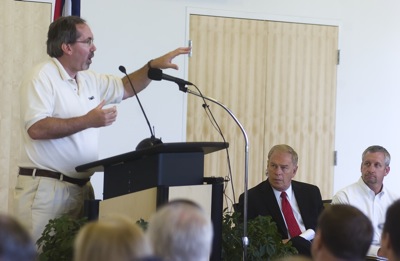
Photo by Mark Pummell/The Daily Standard
Chris Korleski, Environmental Protection Agency director, speaks Friday during the meeting about Grand Lake's water quality as Gov. Ted Strickland, center, and Sean Logan, Ohio Department of Natural Resources director, listen.
The state may prohibit farmers in the Grand Lake Watershed from wintertime manure application and require them to obtain a comprehensive management plan.
The proposals introduced Friday as part of a solution to Grand Lake's water quality problems could go into effect in December if approved.
The rule prohibiting manure application for two years between Dec. 15 and March 1 would cause challenges for some farmers, but it would likely help reduce nutrient loading to the watershed and Grand Lake, said Nikki Hawk of the Mercer County Soil and Water Conservation District (SWCD). The waste could still be spread in winter, but the farmer would need to get approval for each application from the chief of the state's division of soil and water.
"It's going to be a challenge because they (area farmers) don't all have the 31/2 months of storage the new rule says," Hawk said.
Spreading animal waste in the winter is legal for small- to medium-sized farms, but the practice is not recommended because the manure is more prone to runoff during melt or rain events. Producers on large farm operations that require state permits are not allowed to apply manure on frozen and/or snow-covered land and must have a Comprehensive Manure Management Plan (CNMP) .
About 25 percent of the roughly 300 livestock farms in the watershed do not have structures that allow for at least 31/2 months of storage, said Terry Mescher, state agriculture engineer.
But, Hawk added, the agriculture community needs to take care of anything it may be doing that is causing the problem.
"If we can take ag out of the equation then more efforts can be focused on the internal loading of nutrients and other sources," she said. "We have to work with our producers on all ways possible to make sure they're reducing any nutrients going to the water."
Excess nutrients, particularly phosphorous in sewage, agriculture runoff and commercial lawn and ag fertilizers, feed the blue-green algae consuming the lake. Studies show most of the phosphorous comes from runoff from farmland.
Watershed farmer and Mercer County Farm Bureau president Dennis Howick said he believes every livestock farmer should have a CNMP, a formal document for managing nutrients based on federal guidelines. He has one and uses it to help him know which fields need nutrients and which ones don't.
The Mercer SWCD develops the CNMP for free, but the office is so busy it will take awhile for a farmer to get one done, Mescher said. Private firms provide CNMPs for $800 to $2,000, more or less, depending on the size of the operation and extent of the plan.
About 25 percent of the roughly 300 livestock farms in the watershed have a CNMP, Mescher said.
The proposed rule change on spreading manure also is a good idea, but, Howick said, there are exceptions to every rule.
"It's best not to, but if it becomes necessary to avoid a bigger problem then it should be OK," he said. "Like if someone's manure lagoon is going to run over."
If it has to be applied, the farmer should follow USDA guidelines for application, which include using setbacks and applying on land with some sort of cover crop, Howick said.
Studies show that the majority of the nutrients that enter the watershed annually does so in the fall and winter months after crops have been harvested and manure is spread on bare ground.
Last week watershed farmers became eligible to apply for part of $1 million in USDA funds leveraged by Strickland and Sen. Sharrod Brown to install conservation practices. Priority will be given to farmers requesting funds to move manure out of the watershed and to plant winter cover crops.
ODNR is finalizing wording on the proposlas outlined Friday. They will have to be approved by the Ohio Soil and Water Conservation Commission and then go before the Joint Committee on Administrative Rules (JCAR) and through a public hearing process. The process will take until at least December and then, if approved, be implemented immediately, said Dave Hanselmann, chief of ODNR's Division of Soil and Water Resources.
Howick said watershed farmers were expecting rule changes.
"No, they're not going to be surprised. This has been brewing," he said. "Farm Bureau has been having meetings on these issues ... it was out there."
The Lake Improvement Association has pushed for ag-related changes, including a restriction on wintertime manure application. President Tim Lovett said the community working collaboratively with state and federal agencies will improve the lake's condition.
"I'm an optimist, I sincerely believe we're going to get this lake turned around," he said. "Local people, groups and committees, we're the ones who are going to have to make that happen."

